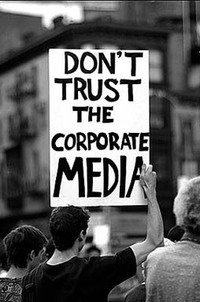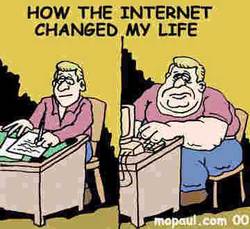Why are people so disgusted with the present political campaign?
It’s not about us. (Picture by Fred Askew from MonthlyReview.)
Candidates give lip service to this being about us, but it seems to be more about the media and the pundits and their own obsessions than about us.
Campaigns generally get into the weeds like this when the discussion about us becomes uncomfortable to the elites in power. It’s not policy choices which make the elites uncomfortable. It’s the idea of someone other than the elites making those choices which makes them uncomfortable.
I’m not talking here of idiots and know-nothings making decisions based on their own prejudices. I’m talking about candidates and parties addressing our real crisis, not just pandering to our short-term problems but inspiring us with a different future.
What’s happening, to both young and old, is we fear losing control of our future. We don’t know where our next job is. We don’t know if America can ever lead again. We don’t know how we’ll pay our bills or educate our children. We fear we’ve lost control, personally, politically, economically. We’re scared.
(Note: Humor is an important political weapon. From Rombleue.)
There are several ways to approach this fear. We can do it socially,
through the Nixon Thesis, finding someone to blame, to attack, to take
down in order to feel better. We can do it economically, through the
Roosevelt Thesis, getting everyone into doing and believing the same
things. We can do it slowly, through the Progressive Thesis, promising
that we’ll address it all eventually. We can do it violently, through
the Civil War Thesis.
But none of that will work. Because these problems are, by their
nature, completely different. They’re multi-dimensional. They’re
economic problems, demographic problems, environmental and social
problems. All combined.
I’ve proposed a simple frame to address many of these problems. The War Against Oil.
Recognize that it’s our dependence on hydrocarbons which is killing us
and get serious about addressing it. That’s economic policy, it’s tax
policy, it’s environmental policy, and it’s technology policy. It’s a
challenge to our young people, a directive to invent. And it’s
something we can all participate in, by insulating, by car-pooling, by
recycling, in a hundred different ways. Just make it all patriotic.
But there’s a more important job which must be undertaken, one only you
and I and the others on this medium are capable of starting.
That is developing the Internet Thesis into a real political
movement. That is, we call the TV irrelevant, limited, useless. We
reject mere immediacy for the firehose of thought available on this
medium. We embrace complexity and reject simple, black-and-white
solutions to anything.
We’re already doing this in a hundred different ways. Wikis are one
effort. Google is another. Any site which gathers together resources
and offers them up is a way to fight back against the simplicity and
stupidity all around us.
When I talk about organizing, in other words, I’m not talking about marching, protesting, or campaigning. I’m talking about learning, about organizing information so we can put it to work. Information is the great raw material of our time. We are all workers in a great sea of information. Those who can do the most with it will win the future. That’s the Internet Thesis.
I think this is what the TV people are really afraid of, that we will
reject their reality and substitute our own, a deeper, more complex,
more multi-dimensional reality that embraces accelerating change as the
only way forward.
So let’s do that. If the people lead the politicians will follow. That’s the real secret of democracy.











